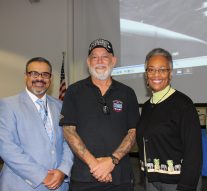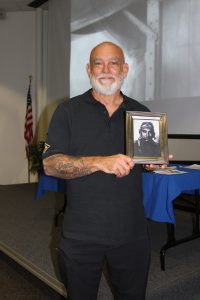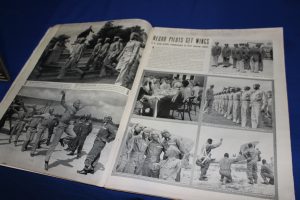
Tuskegee Airmen Speaker Keeps History Alive
SPC Programs & Events February 12, 2018By Prof. Cindy Kuropas
 On February 7, the Tarpon Springs campus hosted Stephen G. Spears, a speaker and son of Tuskegee Airman, Leon “Woodie” Spears. After Woodie Spears passed away ten years ago, Stephen G. Spears felt a responsibility to continue telling his father’s story and the story of the Tuskegee Airmen. Of 996 Airmen, less than 100 are still alive today.
On February 7, the Tarpon Springs campus hosted Stephen G. Spears, a speaker and son of Tuskegee Airman, Leon “Woodie” Spears. After Woodie Spears passed away ten years ago, Stephen G. Spears felt a responsibility to continue telling his father’s story and the story of the Tuskegee Airmen. Of 996 Airmen, less than 100 are still alive today.
When asked what he wanted the students to learn at the event, Spears stated that he wanted the students to “better understand who the Tuskegee Airmen were, the experiences they had, and how they had an impact on the United States military and on the United States in general.” The Tuskegee Airmen were “the difference in breaking down a lot of racial barriers.”
During World War II, the Tuskegee Airmen made history as an all-black regiment of pilots who came from all corners of the United States with a single passion, to fly. Getting the opportunity to fly, however, would not be an easy task. Bigotry and racism were constant road blocks for the Airmen. In 1925, the United States government stated that “blacks are mentally inferior” due to “smaller brains” than whites and “unfit for combat” due to a “lack of voracity” and “initiative.” As Spears shared these statements with the audience, he expressed how infuriated he was to read such statements about the Airmen and his own father.
 Spears’ father, the son of a sharecropper and a Native American woman, persisted in his desire to become a pilot after seeing an article in Life magazine about the first class of Airmen. After being admitted to the program, Woodie Spears faced obstacles during training due to harsh treatment from white training officers and became 1 of only 15 graduates in a class of over 50 recruits who wanted to fly. Woodie Spears flew 51 missions during World War II and was shot down during his 52nd mission by the Germans. For 1 month, Spears was a prisoner of war in Poland; he was later freed by the Russians.
Spears’ father, the son of a sharecropper and a Native American woman, persisted in his desire to become a pilot after seeing an article in Life magazine about the first class of Airmen. After being admitted to the program, Woodie Spears faced obstacles during training due to harsh treatment from white training officers and became 1 of only 15 graduates in a class of over 50 recruits who wanted to fly. Woodie Spears flew 51 missions during World War II and was shot down during his 52nd mission by the Germans. For 1 month, Spears was a prisoner of war in Poland; he was later freed by the Russians.
According to Stephen Spears, The Tuskegee Airmen would not have been possible were it not for the work of Benjamin O’Davis Jr., whom Spears had the honor of meeting twice. O’Davis was commanding officer of the Airmen and became the first African American general officer in the U.S. Air Force.
As Spears spoke of his father and the bravery of the Airmen, he could not help but display his emotion. His love and pride for his father and what his father accomplished for our country set the tone for the speaking engagement. In 2007, Woodie Spears, along with a group of 300 Airmen, was awarded a Congressional Gold Medal from President George W. Bush. Woodie Spears died in 2008, and as his final wish, his ashes were scattered over Moton Field, which served as the training flight facility for the Airmen.
At the end of the presentation, Spears took a moment to reflect on the Airmen, describing them as humble men who did not consider themselves heroes. They were men who just wanted to fly and loved their country. Spears ended with some final words, “God bless the Tuskegee Airmen.”
After the event, SPC student John Palenchar said the event was “really eye-opening to what African Americans had to go through to join the military in World War II.” Dylan Burrows felt the presentation was “insightful” and he learned a lot. Finally, student Jayney Sechler said she “enjoyed the event” and later shared Spears’ story with her father, who served in the Army and knew of the Tuskegee Airmen.
To learn more about the Tuskegee Airmen, you can watch the documentary On Freedom’s Wings: Bound for Glory.
You can also hear the story straight from Woodie Spears himself through numerous interviews that can be found online.





